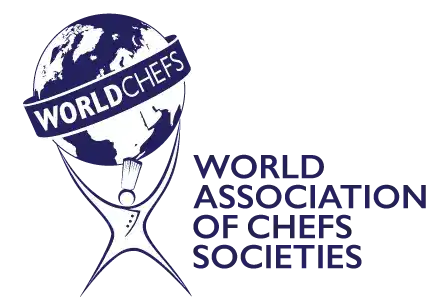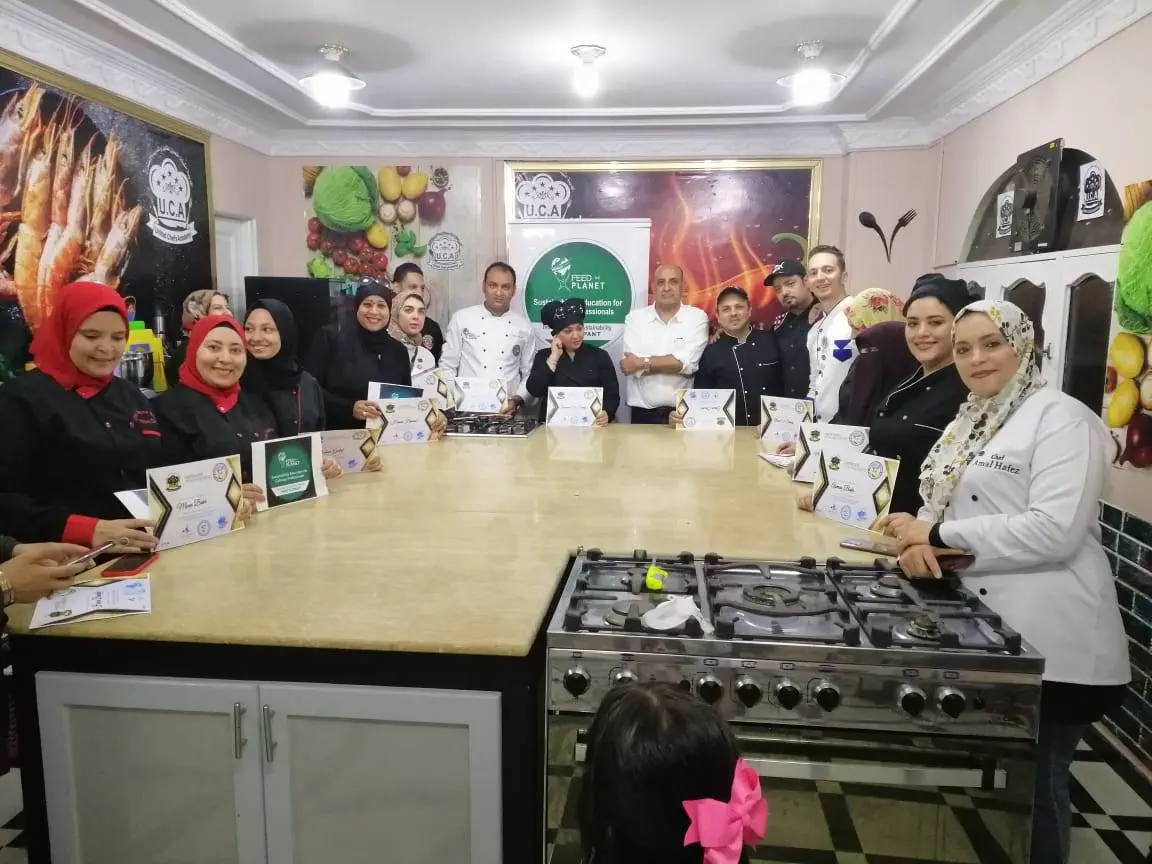Championing Sustainability in the Culinary World: An Interview with Chef Montaser Masoud
In a candid conversation, Chef Montaser Masoud reveals his remarkable journey in promoting sustainability among culinary professionals, his passion for preserving human health, and his dreams for a more sustainable culinary industry.
The culinary landscape is evolving, and at its forefront stands Chef Montaser Masoud, a culinary visionary with an unwavering commitment to sustainability and cultivating a new generation of eco-conscious culinary professionals. We had the privilege of sitting down with Chef Montaser Masoud to discuss his involvement in the Sustainability Education for Culinary Professionals program, his experiences training chefs, and his vision for the future of sustainability in the culinary world.
When did you get involved with the Sustainability Education for Culinary Professionals program?
“In 2019, I embarked on my journey in sustainability education by receiving training from the World Association of Chefs Societies. I was among the first group of trainees, and in 2020, I became a certified trainer, specializing in teaching sustainability to culinary professionals as part of the “Train the Trainers’ program.”
How many students have you trained so far?
“My involvement in sustainability education has been profoundly transformative. I’ve had the privilege of training 1,895 chefs across diverse regions, including Egypt, Jordan, Saudi Arabia, Iraq, Syria, Kuwait, Qatar, UAE, Oman, Tunisia, Algeria, Morocco, Germany, and Turkey.”
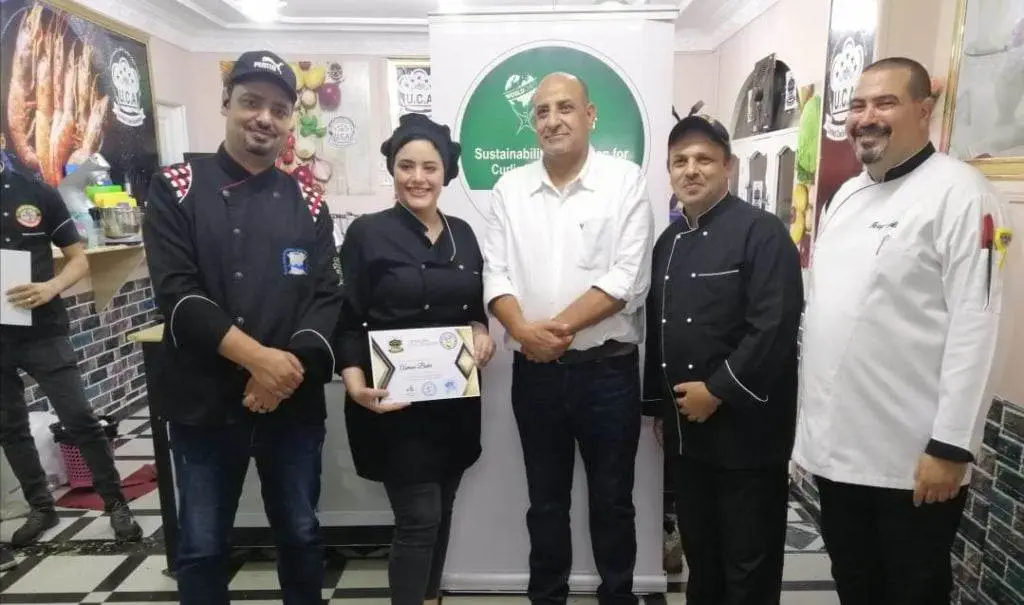
Why cooking? What drove you to the kitchen to begin with?
“Cooking, for me, represents a beautiful realm filled with creativity and a deep sense of responsibility for ensuring people’s safety from contaminated food. Over time, I realized the paramount importance of sustainability. In the past, discussions around food primarily focused on ingredients and cleanliness but rarely touched on food sources, environmental harmony, or sustainability. My passion for this field grew as I delved deeper into the intricacies of sustainability. I explored costing, calculations, and the ever-evolving landscape of food. Throughout my 36-year journey in the hotel industry, I witnessed the emergence of new products promoting vegetarianism and alternative ingredients. This journey led me to create unique sustainable ingredients, including plant-based alternatives, which gained recognition among my peers. The concept of sustainability later crystallized my purpose, connecting it with energy efficiency and responsible sourcing of ingredients, leading to reduced waste and resource conservation. My dedication to the kitchen extends beyond just cooking; it revolves around safeguarding human health. I firmly believe that honesty is the cornerstone of the chef-customer relationship, especially when dealing with allergies or dietary restrictions. The kitchen has evolved into a discipline that combines chemistry, physics, and medicine, offering a holistic approach to food preparation and consumption.”
“Throughout my career, I consistently explored methods to minimize food waste. I became dedicated to reducing waste and preserving valuable resources. I researched equipment that could facilitate the decomposition of food waste, turning it into animal feed, soil enrichment, or nourishment for small-scale farms. My experiences in sustainable practices extended to villages near hotels, where I initiated initiatives to transform food waste into sustainable animal feed and natural fertilizers. Collaborating with friends in Tunisia and Morocco, we successfully dried kosher food items and vegetables, ground them, and repurposed them for agricultural use. These practices have yielded positive results and were presented in reports with accompanying visuals.”
What advice would you give to people who are interested in teaching others?
“Sharing insights as an educator, I offer valuable advice to those interested in teaching and mentoring in the culinary profession or sustainability-related fields. First, I encourage educators to introduce unexpected elements in their teaching methods. Expose students to thought-provoking documentaries like ‘Garbage Village,’ ‘Some Seas,’ and ‘Some Contaminated Food.’ Such content can help direct their attention towards sustainability. Additionally, incorporating humor through funny videos can enhance the learning experience. When explaining sustainability concepts, it’s crucial to remain adaptable and acknowledge that awareness and understanding may vary among students. To avoid repeating past mistakes and to adapt to evolving circumstances, students should be equipped with the tools of experiential learning. Not all experiences hold the same educational weight; some offer profound lessons in sustainability, while others provide smaller insights. It’s essential to recognize that isolation and detachment from diverse experiences hinder learning from past experiences.”
What sets this sustainability curriculum apart from others?
“Sustainability is a profound concept that has taken center stage in the 21st century. It plays a critical role in preserving our resources in a world abundant with riches. While we can imagine a future where some resources, such as water, energy, fish populations, lakes, and even rainfall, might become scarce, sustainability serves as our safeguard. The key lies in preserving these resources not only in our kitchens but also in our professional lives and homes. Those who embark on a journey of sustainability become well-versed in its many facets. The field of energy has evolved into a complex landscape, with several countries embracing clean energy practices to secure their futures. The creation of artificial lakes, for instance, acknowledges the potential depletion of natural fish populations. Sustainable practices include plant-based alternatives to animal protein, emphasizing the responsible utilization of grains and vegetables. This movement resonates with the new generation.”
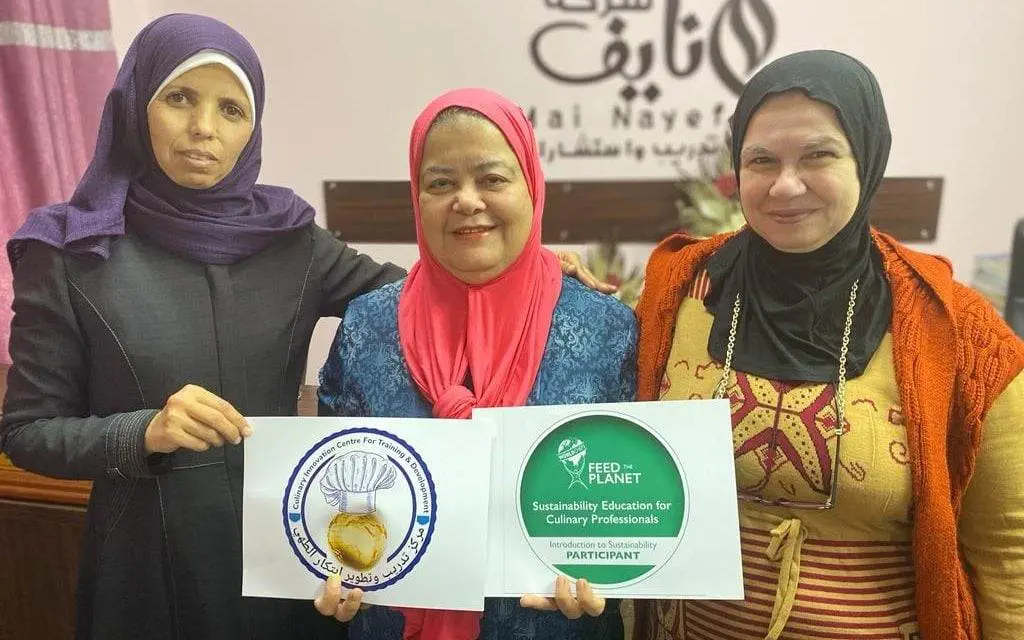
How do you think the culinary industry is different today from when you started?
“It’s essential to recognize that the culinary industry has undergone significant transformations since my journey began 36 years ago. In the past, obtaining quality ingredients often involved intricate exchanges of information, recipes, or handwritten notes between chefs. Ingredients were not as readily available as they are today through online channels. However, the true transformation occurred with the advent of sustainability. This era, as I like to call it, revolutionized the world by instilling sustainable practices. Subsequently, we’ve entered a new era of growth, guided by the principles of sustainability. Sustainability now resides at the core of our dreams and actions, encompassing fields like artificial intelligence. Innovations such as plant-based meats produced through artificial intelligence, offering pure protein from vegetarian sources, have gained prominence. This concept is gaining traction in the Middle East and Europe, aligning with the United Nations’ visions for 2030 and 2050.”
How did joining the Feed the Planet training program help you with your career?
“My journey through the Feed the Planet training program was a transformative experience, expanding my dedication to sustainability. It broadened my perspective, leading me to consistently question the sustainability of various aspects of life. This transformation manifested in a simple yet profound question: ‘Are you a sustainable person?’ My career thrived as I became a role model, notably for my involvement as a trainer in sustainability for culinary professionals in the Arab world. We initiated efforts to educate chefs about the significance of sustainability and its application in their careers. This endeavor ignited a spark among people, prompting them to implement sustainability practices independently, a fact for which I extend gratitude to Worldchefs.”
What’s a memorable success story or transformation you’ve witnessed in one of your students through the Sustainability Education for Culinary Professionals program?
“Teaching sustainability in the Arab world came with its unique set of challenges, as many people had heard the term but did not fully grasp its meaning. It was a fulfilling endeavor to be part of a movement to teach these chefs what sustainability truly meant and how to integrate it into their professional lives. The most significant success story I’ve witnessed is the growing awareness of sustainability among chefs and their dedication to incorporating sustainable practices into various aspects of their lives. This achievement is a testament to the effectiveness of the education we provided through the program.”
In your view, what role can culinary professionals play in addressing global sustainability challenges, and what excites you about the future of sustainability in the culinary world?
“The role of culinary professionals in addressing global sustainability challenges is of paramount importance. We must take the initiative to train chefs on the ground to realize the dream of sustainability in the Arab world. This undertaking should encompass various forms of education, including film screenings and hands-on training in open symposiums over four to five days. My commitment to sustainability education extends to creating specialized courses in culinary schools, equipping future chefs with the knowledge and skills needed to implement sustainable practices. It’s my hope that all individuals, not just chefs, in the Arab world investigate and understand sustainability’s meaning to ensure a future where food, energy, fish populations, water resources, and more continue to thrive. We must remain steadfast in our quest to preserve these resources and promote a sustainable future. The journey of sustainability begins with us, and together we can drive positive change.”
What’s your vision for the next generation of culinary professionals who are passionate about sustainability? How do you hope they will influence the industry and the world at large?
“I am enthusiastic about teaching the next generation of chefs, instilling in them the significance of sustainability in the culinary world. My goal is to empower these young individuals to champion the cause of sustainability, not just within the culinary industry but also in the broader world. Through my writing, which spans Arabic, English, and French, I aim to reach chefs across different regions, fostering a shared understanding of sustainability. As a bridge between diverse culinary communities, I always make myself available to explain the intricacies of sustainability to those who seek knowledge. By engaging with this new generation, answering their questions, and providing valuable insights, I hope to create a community of sustainability advocates who can transform the culinary industry and beyond, aligning with the United Nations’ vision for a sustainable future by 2030 and 2050.”
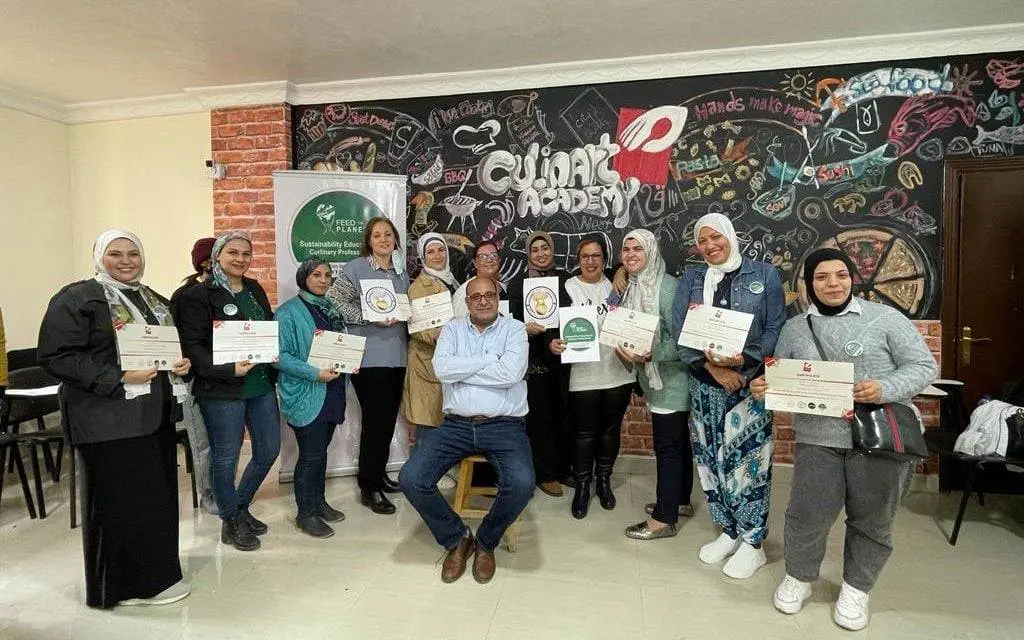
Chef Montaser Masoud’s journey is a testament to the transformative power of sustainability education. His dedication to preserving human health and promoting sustainable practices is a beacon of hope for the culinary world and the global community at large. With visionary educators like Chef Montaser Masoud leading the way, the future of sustainability in the culinary industry is indeed promising.
Take action
Start the Sustainability Education for Culinary Professionals course for free at www.worldchefsacademy.com, and receive a digital badge to show your achievement.
The Worldchefs Academy mobile app can be downloaded on both the App Store and Google Play, and at www.worldchefsacademy.com.
Sustainability Education for Culinary Professionals is made possible with the support of Feed the Planet partners and the tireless contributions of Worldchefs’ members around the globe. Worldchefs extends the utmost gratitude to all course participants, program trainers, and educational institutions who bring their time, expertise, and vision to all Feed the Planet initiatives.
To learn more about Feed the Planet, visit feedtheplanet.worldchefs.org.
